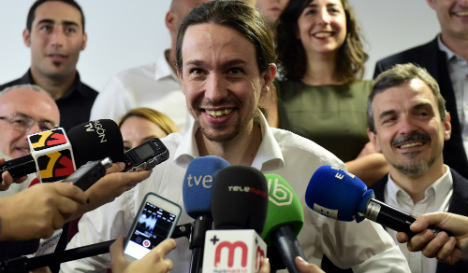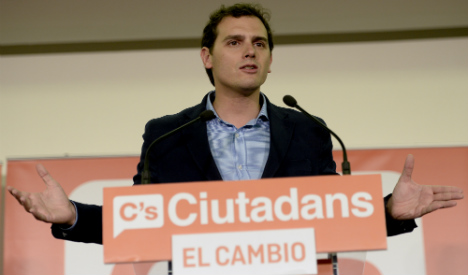Elections will be critical test for fractured system

You have to be either foolish or very brave to try and predict the outcome of Sunday’s local elections in Spain.
However, there is one reasonable assumption to be made and it is this: the parties that have dominated Spanish politics for two decades: the Socialists and Popular Party will no longer do so, unless they form a coalition with some, until now, minor parties.
The influence of two new parties, Podemos and Ciudadanos, is extending all over the country, including in areas rooted in strong nationalist tradition like Catalonia and the Basque Country. Both parties have a large backing in the big capitals, such as Madrid, Barcelona, and Valencia, where they can tilt the traditional political balance.
Podemos (We Can), led by Pablo Iglesias, a university teacher of politics in Madrid, was the third most voted party in the European elections in Spain last year. Iglesias won 5 seats and 8 percent of the votes. Podemos’s surge and the extent of the main political parties was not foreseen by opinion polls.

Pablo Iglesias, the pony-tailed leader of Podemos Photo: AFP
They voice the discontent of young Spaniards. Its strong affinities with the Greek Syriza has made it the target of attacks from the conservative parties, and very often from the socialists too.
Podemos, however, is not taking part in the local elections this time. They prefer to focus on the general elections to be celebrated at the end of this year. Instead, some groups ideologically close to Podemos with the name Ganemos (Let Us Win) will pose a major challenge in the electoral contest in the largest cities.
Ciudadanos (Citiizens) is an emerging force born in Catalonia in response to the nationalist parties. In under a year they have become very popular in the rest of Spain. The party’s leader, Albert Rivera, a young and photogenic lawyer is attracting a lot of attention as the new captain of the political centre. There are few doubts that he is bound to play a major role in the future of Spanish politics.

Albert Riveria, the leader of Ciudadanos - the Citizens - party. Photo: Josep Lago / AFP
Ciudadanos are attracting centre-right voters. They offer a reformist agenda that is a middle-ground between the prolongation of the system shaped by the PP and PSOE and a more radical change proposed by Podemos.
It seems likely that Ciudadanos will hold the key, not only for regional and local parliaments, but for the nation’s government.
Not a single day goes by without a new case of corruption being unveiled. Even some members of the royal family have been on trial . Spain is no longer the successful country which made a smooth transition from a dictatorship to a democracy.
Despite the latest indicators, which confirm the growth of the Spanish economy, after six years of stagnation the truth is that unemployment levels are still the highest in Europe, 23 percent, which rivals this figure in Greece.
For young people, with 50 percent unemployment the future looks bleak. Many have opted to go abroad to get jobs they cannot find in Spain. The European Union has urged Spain to create new jobs. The future of retirement pensions is at stake. Education and Health have suffered serious cuts. The budget of two Spanish football clubs exceed that of the largest hospital in the country, La Paz (Madrid) with 3.300 workers, and more than 200.000 patients per year.
In this political climate the promises of the president, Mr Rajoy, go nowhere. Some members of his party applaud his calm, but many others accuse him of hiding his head in the sand and of not wanting to confront the problems which face Spain. Some miss the energy of his party predecessor, Jose Maria Aznar.
Challenged by some prominent members of his own party, Mr Rajoy hopes the recovery of the Spanish economy and his stern defence of Spain’s unity will play in his favour. But this may not be enough.
Four out of ten Spaniards don’t know who to vote for. In a science survey carried out in the country recently, 25 percent of those questioned thought that the Earth spins around the Sun. It can be hoped that their political knowledge is better than their scientific understanding. Podemos and Ciudadanos are now the new stars and Spanish politics may have begun spinning around them.
Alberto Letona is a Basque journalist living in Bilbao. He is the author of Hijos e Hijas de la Gran Bretaña - Sons and Daughters of Great Britain – in which he delves into the psyche of the British in an attempt to explain them to his own countrymen.
Comments
See Also
However, there is one reasonable assumption to be made and it is this: the parties that have dominated Spanish politics for two decades: the Socialists and Popular Party will no longer do so, unless they form a coalition with some, until now, minor parties.
The influence of two new parties, Podemos and Ciudadanos, is extending all over the country, including in areas rooted in strong nationalist tradition like Catalonia and the Basque Country. Both parties have a large backing in the big capitals, such as Madrid, Barcelona, and Valencia, where they can tilt the traditional political balance.
Podemos (We Can), led by Pablo Iglesias, a university teacher of politics in Madrid, was the third most voted party in the European elections in Spain last year. Iglesias won 5 seats and 8 percent of the votes. Podemos’s surge and the extent of the main political parties was not foreseen by opinion polls.

Pablo Iglesias, the pony-tailed leader of Podemos Photo: AFP
They voice the discontent of young Spaniards. Its strong affinities with the Greek Syriza has made it the target of attacks from the conservative parties, and very often from the socialists too.
Podemos, however, is not taking part in the local elections this time. They prefer to focus on the general elections to be celebrated at the end of this year. Instead, some groups ideologically close to Podemos with the name Ganemos (Let Us Win) will pose a major challenge in the electoral contest in the largest cities.
Ciudadanos (Citiizens) is an emerging force born in Catalonia in response to the nationalist parties. In under a year they have become very popular in the rest of Spain. The party’s leader, Albert Rivera, a young and photogenic lawyer is attracting a lot of attention as the new captain of the political centre. There are few doubts that he is bound to play a major role in the future of Spanish politics.

Albert Riveria, the leader of Ciudadanos - the Citizens - party. Photo: Josep Lago / AFP
Ciudadanos are attracting centre-right voters. They offer a reformist agenda that is a middle-ground between the prolongation of the system shaped by the PP and PSOE and a more radical change proposed by Podemos.
It seems likely that Ciudadanos will hold the key, not only for regional and local parliaments, but for the nation’s government.
Not a single day goes by without a new case of corruption being unveiled. Even some members of the royal family have been on trial . Spain is no longer the successful country which made a smooth transition from a dictatorship to a democracy.
Despite the latest indicators, which confirm the growth of the Spanish economy, after six years of stagnation the truth is that unemployment levels are still the highest in Europe, 23 percent, which rivals this figure in Greece.
For young people, with 50 percent unemployment the future looks bleak. Many have opted to go abroad to get jobs they cannot find in Spain. The European Union has urged Spain to create new jobs. The future of retirement pensions is at stake. Education and Health have suffered serious cuts. The budget of two Spanish football clubs exceed that of the largest hospital in the country, La Paz (Madrid) with 3.300 workers, and more than 200.000 patients per year.
In this political climate the promises of the president, Mr Rajoy, go nowhere. Some members of his party applaud his calm, but many others accuse him of hiding his head in the sand and of not wanting to confront the problems which face Spain. Some miss the energy of his party predecessor, Jose Maria Aznar.
Challenged by some prominent members of his own party, Mr Rajoy hopes the recovery of the Spanish economy and his stern defence of Spain’s unity will play in his favour. But this may not be enough.
Four out of ten Spaniards don’t know who to vote for. In a science survey carried out in the country recently, 25 percent of those questioned thought that the Earth spins around the Sun. It can be hoped that their political knowledge is better than their scientific understanding. Podemos and Ciudadanos are now the new stars and Spanish politics may have begun spinning around them.
Alberto Letona is a Basque journalist living in Bilbao. He is the author of Hijos e Hijas de la Gran Bretaña - Sons and Daughters of Great Britain – in which he delves into the psyche of the British in an attempt to explain them to his own countrymen.
Join the conversation in our comments section below. Share your own views and experience and if you have a question or suggestion for our journalists then email us at [email protected].
Please keep comments civil, constructive and on topic – and make sure to read our terms of use before getting involved.
Please log in here to leave a comment.